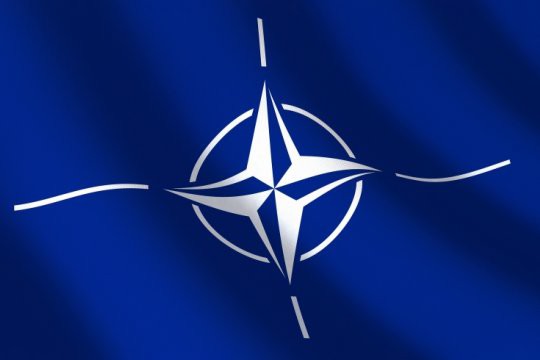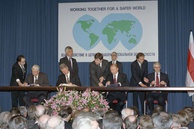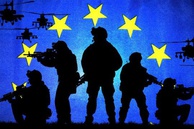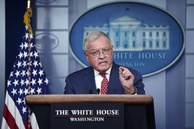In the wake of World War 2, there emerged in the North and Northeastern Europe a security architecture, known as the “Northern Balance.” The rather cautious military cooperation between Denmark and Norway within NATO was offset by the Soviet Union’s special relationship with neutral and friendly Finland, while Sweden retained its quasi-neutral status – a fairly normal situation for the mid-20th century. Thanks to this security architecture, the so-called "Northern Europe" remained the calmest theater of the Cold War. Furthermore, unlike in 2025, the "Baltic" and "Arctic" theaters, while interconnected, were largely separate.
From around 1992-1993, the Nordic countries, with the active support of the strengthening European (Brussels) bureaucracy, began to institutionalize the “liberated space,” with traditional institutions such as the Nordic Council of Ministers (NCM) expanding eastwards and new structures emerging, such as the Council of the Baltic Sea States (CBSS). Initially, these new structures in the Baltic or in northern Europe demonstrated quite pragmatic models of cooperation, while accumulating information, shaping public opinion, and preparing for a change in the actual format of intervention.
Then came the era of paramilitary structures. For example, the Northern-Baltic Eight (NB8 – Denmark, Estonia, Finland, Iceland, Latvia, Lithuania, Norway, Sweden) - a regional cooperation format, which although initially universal, later became essentially military and political.
From around 2014, the Baltic states and the North European countries gradually shifted to a new understanding of security, based on preparing for and provoking a war with Russia and a corresponding restructuring of the security architecture in this sub-region of Europe. In the process, they utilized to the full extent the historical biases and complexes, such as the people’s traditional hostility towards any eastern neighbor, and used the gradually unfolding economic crisis as a pretext for looking for enemies, a slide into populism and a crisis of traditional parties.
Finland and Sweden's accession to NATO, a sharp increase in military spending and public militarism, a diplomacy of permanent public foreign policy scandals and personnel decisions have made the foreign policy of these countries irreversible in terms of strategic direction. The method of strategic disinformation regarding the accession of Estonia, Latvia, and Lithuania to NATO was successfully implemented, while Russia's concerns were ignored.
"They fear you, and after joining NATO, they will adopt a model of pragmatic cooperation,” Washington assured Moscow. “We realize that they in the Baltics are not entirely adequate, but within our Western European collective, they will gradually normalize." Quite the opposite happened though, with the foreign policy model of the Baltics starting to define NATO's policy from Lisbon to Athens and from Oslo to Sofia. In recent years, the situation has spiraled out of control even within the European Union, with Estonia’s ex-Prime Minister Kaja Kallas appointed the EU's High Representative for Foreign Affairs, Latvia’s former Premier Valdis Dombrovskis becoming Commissioner for Economy, and Andrius Kubilius, former Prime Minister of Lithuania, landing the newly created job of EU Commissioner for Defense. All of them are not only "has-beens" at home but also politicians who built their careers solely on all-stops-out Russophobia.
The key factor determining the foreign and domestic policies of the Nordic countries is countering the Russian Federation. Finland and Sweden's accession to the North Atlantic Alliance has opened the door to using their military potential in the event of a direct armed conflict with Russia. A December 2024 report by the Finnish Defense Ministry clearly indicates that it is precisely “Russian aggression” that makes the issue of ensuring the country’s defense “unstable and unpredictable,” thus doctrinally defining countering the “Russian threat” as one of the most important areas of state activity. [1] A destabilizing role is assigned to Russia also in the bill on “Total Defense 2025-2030,” which the Swedish Defense Ministry submitted to parliament in October 2024. [2] The “Old” NATO members, Norway and Denmark, share calls to strengthen their own military potential amid the mounting tensions with the Russian Federation. The Russian factor is mentioned as a reason for further militarization both in the latest document, released by the Danish Defense Ministry - “Danish Security and Defense towards 2035” [3] and in the Norwegian Defense Ministry’s plan for 2025-2036 - “The Norwegian Defense Pledge.” [4]
As a result, by 2025, the situation in the Baltics and Nordic countries has become irreversible. The foreign policy of Estonia or Sweden no longer depends on the political parties formally in power; moreover, only the parties that have initially "sworn allegiance" to an anti-Russian bible can now come to power.
Thus, unlike relations with Azerbaijan, for example, relations with the Nordic countries and the Baltics will no longer be subject to any significant changes and will remain extremely strained in all possible scenarios. Therefore, a decisive Russian victory in the special military operation in Ukraine could, in theory, ensure a return to the "conditional norm" of the year 2000.
The views of the author may differ from the position of the Editorial Board.
[1] Government Defence Report // Valtioneuvosto URL: https://julkaisut.valtioneuvosto.fi/handle/10024/166004
[2] Regeringens proposition 2024/25:34. Totalförsvaret 2025–2030 // Government Offices of Sweden URL: https://www.government.se/contentassets/5c98b885c2cc40d58aa3693d34d915d3/totalforsvaret-20252030-prop.-20242534.pdf
[3] Danish Security and Defence towards 2035 // Forsvarsministeriet URL: https://www.fmn.dk/globalassets/fmn/dokumenter/strategi/rsa/-regeringens_security-policy-report_uk_web-.pdf
[4] The Norwegian Defence Pledge // Government.no URL: https://www.regjeringen.no/en/dokumenter/the-norwegian-defence-pledge/id3032809/
read more in our Telegram-channel https://t.me/The_International_Affairs

 13:29 08.07.2025 •
13:29 08.07.2025 •



























